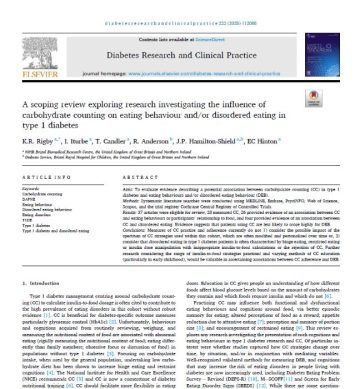Exploring links between carbohydrate counting and eating disorders in people with type 1 diabetes
- 8 May 2025
Evidence suggests that people with type 1 diabetes who count carbohydrates are less likely to experience eating disorders, according to a recent review of past studies. But this review also found significant gaps in the research, particularly in the way carbohydrate counting is measured.
The review, led by Bristol BRC researchers, is published in Diabetes Research and Clinical Practice.
Eating disorders are more common in people with type 1 diabetes than in the general population.
The National Institute for Health and Care Excellence (NICE) recommends that people with type 1 diabetes count the amount of carbohydrates in the food they eat, to decide how much insulin to take. But there are concerns that this routine measuring, weighing and thinking about food may influence eating disorders.
This review found that studies looking at the link between carbohydrate counting and eating disorders did not adequately measure carbohydrate counting behaviours.
People with type 1 diabetes approach calculating their insulin dose in different ways. They use a broad spectrum of strategies, which are often described as carbohydrate counting but may not always involve focused weighing, measuring or looking at nutritional information. Studies did not take this into account.
Studies also failed to consider that type 1 diabetes and disordered eating, known as T1DE, is often characterised by restricted eating, taking inappropriate doses of insulin and/or rejecting carbohydrate counting.
The review suggests that future research on this topic needs to consider:
- How and when people with type 1 diabetes start carbohydrate counting, especially those with early-onset type 1 diabetes
- The different ways people with type 1 diabetes determine insulin dose and/or calculate the carbohydrate in food
- The way people with type 1 diabetes think about food
- Past and present exposure to, and use of carbohydrate counting, including reasons for adapting and/or rejecting strict carbohydrate counting
37 articles were included in the review. Of the 70% of articles that measured carbohydrate counting and eating behaviours:
- 39% found that carbohydrate counting influenced eating more or less of specific foods or food groups
- 29% found it impacted perceptions of dietary flexibility
- 14% found it influenced perceptions of dietary restriction
- 18% found it changed peoples’ perception of food
Of the 28% of articles that measured carbohydrate counting and disordered eating behaviours, 50% found a link between the two. People who used carbohydrate counting were less likely to exhibit disordered eating behaviours.
Karen Rigby, lead author of the review, said:
“Current measures of carbohydrate counting cannot robustly ascertain whether practising carbohydrate counting contributes to the high prevalence of type 1 diabetes and disordered eating, known as T1DE.
“Further research combining robust measures of insulin dose calculation strategies and measures of disordered eating behaviours are required to ascertain any relationship between carbohydrate counting and T1DE.”
